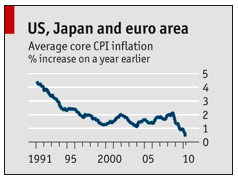
The City and the media seem to be convinced that inflation is back on the cards. They see the inflation statistics are double what they’re supposed to be and assume that means we’re in a new era of inflation. But it’s a lazy expert that takes today’s statistics and extrapolates them forwards. What’s required here is a real understanding of what lies behind the data.
Fact is, the pundits may be right in the end. But that’s no good if we suffer crushing deflation first. In this game you need to be right and be right at the right time.
Getting the inflation/deflation call right is absolutely paramount for your investments. Inflation kills bonds and deflation kills shares. But getting the timing right is what’s going to set you apart from other investors.
The latest round of global austerity has re-opened a very real possibility for deflation. So let’s have a look at where these inflation scares are coming from and I’ll show you why you needn’t worry about them. Better still, we’ll see how a deflationary bust should offer patient investors plenty of opportunities.
What’s really behind the inflation stats
First, let’s get something straight. World-wide we’re not suffering inflation. Just take a look at the following chart from the Economist.
Global core inflation has been in a downtrend for over twenty years. It’s only in the UK that we’ve suffered ‘imported inflation’. Let’s have a look at what this is and how it all happened. Then, when you’re convinced it doesn’t look like a problem, we’ll see how deflation could actually increase your wealth!
The UK financial services industry skewered the pound
In summer 2007, the sub-prime lending crisis spread from the US to the rest of the world. It’s hard to imagine, it was nearly three years ago that the global shockwaves sent Northern Rock to the wall.
Many a Brit sat at home, watched the news (seemingly 24/7 financial crisis) and felt that this didn’t affect them. Heck, all the bank depositors got their money back. Gordon saved the world – what was all the fuss? Life goes on.
In reality, everyone in the UK was affected. This was a financial crisis. Countries most exposed to the financial industry suffered. This meant the UK, though one country even outdid us in reckless finance.
Iceland’s banks built up foreign liabilities nine times the size of their economy. That’s simply incredible. How on earth did they get away with it? When the game was up, the Icelandic Krona collapsed. Like Iceland, the UK was singled out as vulnerable to being wiped out by its banking system. Our banking liabilities approached six times the size of our economy.
Your FREE oil report: The 3 best ways to play the coming oil supply crunch right now!
- Discover how to profit from oil without ever owning a single barrel
- Why NOW is the best time to put a few carefully selected oil investments into your portfolio
Put simply, our weak banking system hammered the pound down and that’s what gave us inflation.
The weak pound means you pay
The low pound means expensive imports. And that means higher prices for all our imported goods. That’s imported inflation. It takes a while for these currency effects to feed through into higher prices. But they do, and today we’re suffering imported inflation from when the pound was at its lowest ebb. That’s what’s feeding into the inflation figures that look so bad.
But in the last year or so, the pound has sprung back against the euro, our largest trading partner. But is anyone in the media talking about this reversal? About the fact that ‘imported inflation’ is not sustainable inflation!
Our Government – nay, the whole of Europe – is pursuing austerity plans. This is not an inflationary environment. The policies we’ve heard about from George Osborne, from Chancellor Merkel, let alone the budgets foisted on countries wishing to borrow from the IMF, are deflationary.
Where’s the money going to come from to cause inflation? Apart from bankers, who’s looking at pay rises? Who’s splashing out on the plastic? Who’s drawing thousands from the ‘bank of bricks and mortar’?
Nothing has changed in the last year to say that we’re heading into inflation. All the pundits have got are some figures on the price of UK goods and services – out-dated inflation stats.
In deflation we trust
The inflationary chutzpah tells you to get rid of your cash. Go out and buy shares, houses, cars – anything, else your cash will just end up being inflated away. Don’t believe them. Keep hold of your money. A deflationary bust will damage asset prices. Remember assets (shares, houses, cars – practically anything) hate deflation.
Cash is king, especially during deflation. Its value rises as other assets collapse. There’ll be plenty of opportunities for those who’ve been patient and have cash on the hip.
• This article was first published in the free investment email
The Right Side
on 25 June 2010
Your capital is at risk when you invest in shares – you can lose some or all of your money, so never risk more than you can afford to lose. Always seek personal advice if you are unsure about the suitability of any investment. Past performance and forecasts are not reliable indicators of future results. Commissions, fees and other charges can reduce returns from investments. Profits from share dealing are a form of income and subject to taxation. Tax treatment depends on individual circumstances and may be subject to change in the future. Please note that there will be no follow up to recommendations in The Right Side.
Managing Editor: Theo Casey. The Right Side is issued by MoneyWeek Ltd. MoneyWeek Ltd is authorised and regulated by the Financial Services Authority. FSA No 509798. https://www.fsa.gov.uk/register/home.do